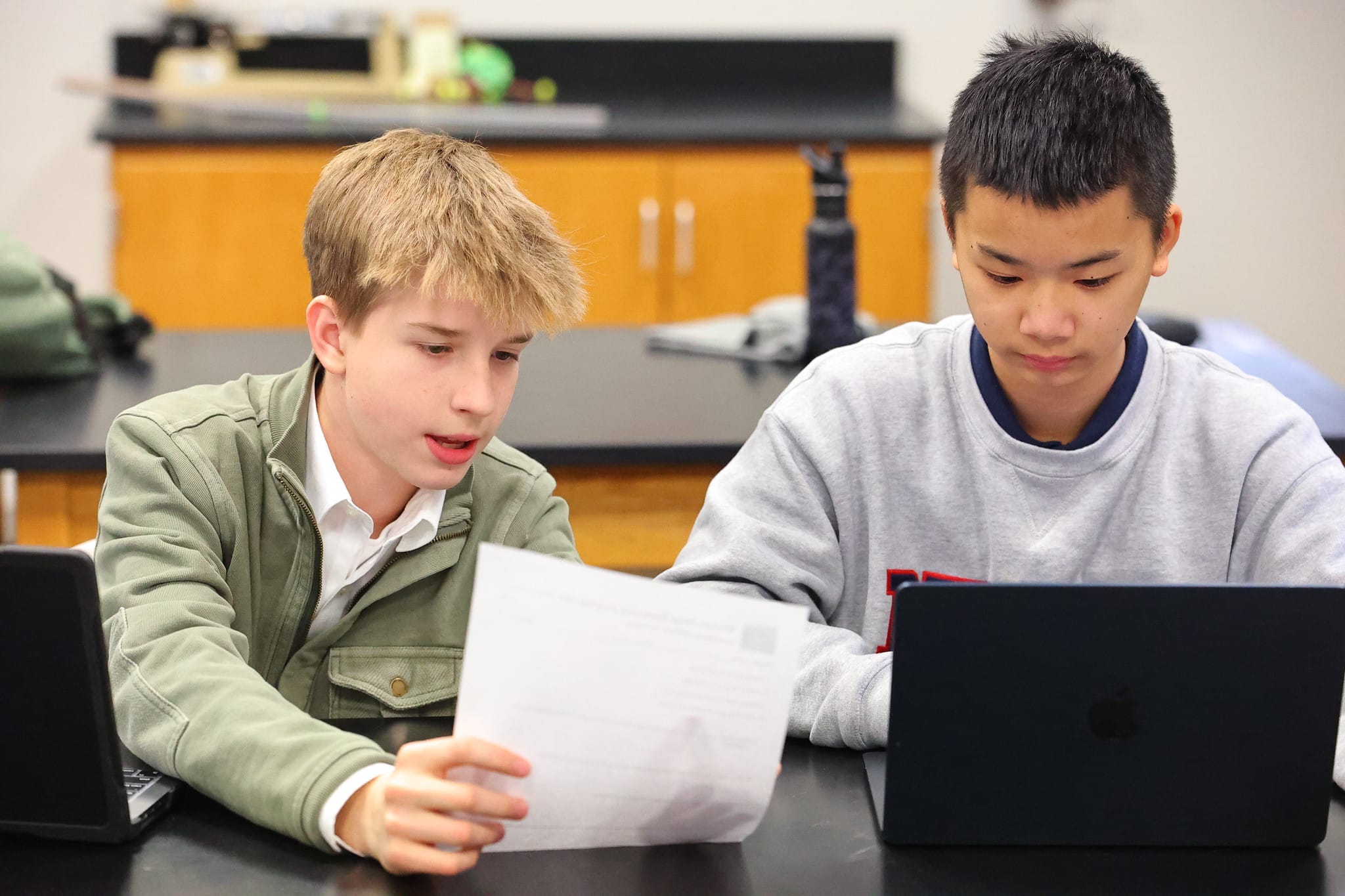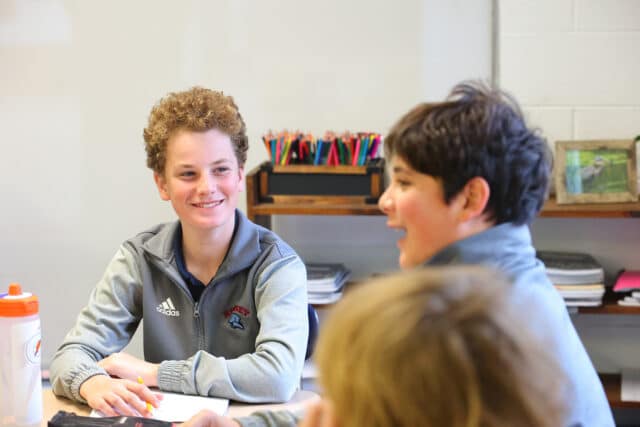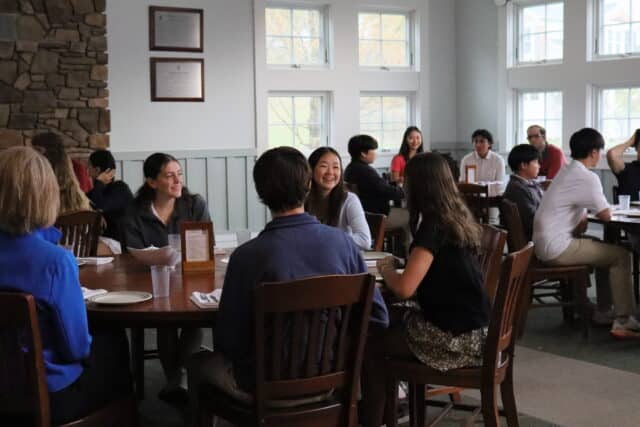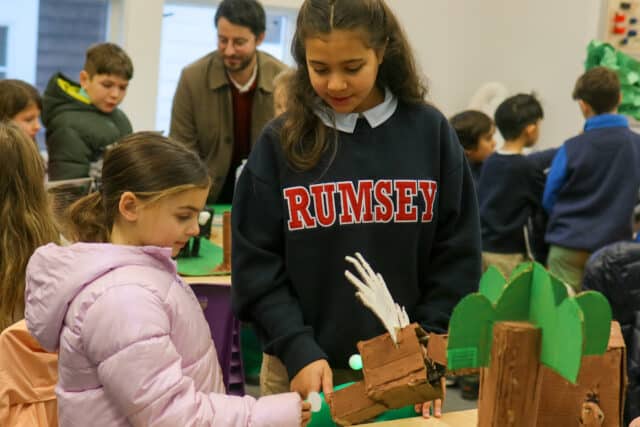
Each course encourages students to take ownership of their learning as they build a strong foundation for secondary school and beyond.
English
Goals and Overview
Guided by our mission and values of Honesty, Kindness, and Respect, the English Department aspires to accomplish these primary goals: to cultivate students’ understanding of literature, to develop their ability to express their ideas accurately and cogently in writing, and to create a respectful environment in which learning and discussion can take place for the exploration of different ideas and shared experiences.
To reach these goals, emphasis is placed on literature from different genres, with various writing assignments that range from analytic essays to creative writing. Public speaking, vocabulary study, and writing with a correct and effective style are also reinforced in each Form. Finally, all English students deliver a memorized declamation, practicing public speaking skills and investing words with meaning for their best rhetorical effect.
IVth Form (Grade 6)
During the IVth Form year, students explore the themes of coming of age, self-discovery, identity, courage, and choices and consequences. Students will learn to recognize the seven elements of a story, along with literary devices such as imagery, symbolism, and personification. Students are also introduced to new vocabulary from the literature. Recent texts taught have included Lois Lowry’s The Giver, Will Hobbs’s Downriver, and The Unteachables by Gordon Korman.
Vth Form (Grade 7)
During the Vth Form year, students examine the way authors develop themes of exclusion, identity, and isolation through an in-depth study of characterization. Moreover, students explore answers to the following essential question: How does conflict affect the relationships between family, friends, and communities? Students also study the memoir genre, and as a culminating project, they write their memoirs. Students continue to investigate the way authors use literary devices to enhance meaning and how they use intentional word choice to communicate with precision. Texts taught have included S.E. Hinton’s The Outsiders, The Boy Who Harnessed the Wind by William Kamkwamba and Bryan Mealer, and Markus Zusak’s The Book Thief.
VIth Form (Grade 8)
During the VIth Form year, students read To Kill a Mockingbird by Harper Lee, William Shakespeare’s Romeo and Juliet, and A Separate Peace by John Knowles. Students examine themes of justice, empathy, and identity through To Kill a Mockingbird and A Separate Peace. Through To Kill a Mockingbird, students annotate for character, setting, and symbolism and how they contribute to the text’s central themes. Journal entries, class discussions, and character analysis exercises serve as the foundation for a formal essay exploring the novel’s themes. Through Romeo and Juliet, students learn to navigate complex texts and infer meaning through tone and context. They develop literary analysis skills by identifying key literary elements and exploring the five-act structure, monologues, and soliloquies. Through read-alouds, dramatizations, and discussions, they also strengthen their public speaking and communication skills. And through A Separate Peace, emphasis is placed on annotating the text and making inferences based on the clues identified in the novel.
VIIth Form (Grade 9)
VIIth Form students read a compilation of short stories, exploring the genre through analysis of plot, theme, and character development. Students respond to the reading through journal entries and then use these thoughts, along with those developed during class discussion, to construct formal essays. During the Winter Term, students read Homer’s classic epic poem, The Odyssey, and continue to develop reading skills necessary for comprehension, interpretation, analysis, evaluation, and overall appreciation of the text. Students pay particular attention to the way Homer’s use of figurative language, including simile, metaphor, personification, symbolism, and allusion, contributes to meaning. In Spring Term, students build upon their studies in classical poetry through a comprehensive survey of poems from the early modern period to the 21st century. In analyzing poems from the likes of Keats and Milton to modern luminaries such as Langston Hughes and Ada Limón, students learn to extrapolate meaning from challenging text and develop an extensive vocabulary of poetic terms. In the latter half of the term, students read selections from contemporary memoirs such as Trevor Noah’s Born a Crime and Michelle Zauner’s Crying in H-Mart in order to prepare them for their Valedictory Speeches. A long-standing Rumsey tradition, Valedictory Speeches gives students the opportunity to write about their experiences at Rumsey and explore the creative non-fiction process through guided workshops.
VIIth Form (Grade 9) Honors English
This is an enriched curriculum for students who take pleasure in learning, reading, and exploring topics in greater depth. A select group of students who demonstrate writing talent and whose scholarship indicates a strong sense of responsibility are candidates for the program. Honors English students launch into the year with The Alchemist, dive deeper into themes of race and society through W.E.B. DuBois’s The Souls of Black Folk, and end with a study of transcendentalism in Into the Wild and the works of Thoreau, Emerson, and London. The year wraps up with a memorable campout on Treasure Island—cooking over an open fire, swimming in the river, and celebrating a year of incredible growth and discovery.
Mathematics
Goals and Overview
The math curriculum provides students with a strong foundation in arithmetic and algebra, focusing on fundamental concepts, operations and the laws and properties governing those operations. This cohesive sequence of courses solidifies students’ mathematical skills while introducing them to the analytical thinking required in later grades. Organizational and study skills, such as note taking and test preparation, are also integrated into the program while class projects and computer applications
further enhance the learning experience.
Math Course I
The Upper School mathematics program begins with an arithmetic course that reviews and integrates previously learned basic skills and presents new, more complex numeric operations and concepts. Topics include: decimals, fractions, percentages, number theory, estimation, measurement, geometry, the metric system, graphs, and logical reasoning. This course also highlights effective class participation and study skills.
Pre-Algebra
This course begins to engage middle school students in analytical and abstract thinking. Topics in Pre-Algebra are interwoven with applied arithmetic in order to build operational and problem-solving skills. The language of algebra is introduced along with two-step equations, inequalities, factors, integers, exponents, proportions, geometric formulas, positive, negative, rational numbers and probability. An emphasis on mastery of skills ensures success in future math courses.
Algebra I/Part 1
The two-year algebra sequence opens with an introductory course examining algebraic operations, expressions and principles. Topics include: algebraic properties and notations, real numbers, inequalities, number lines, variables, equation-solving and an extensive examination of linear functions and their graphs. This first-year course presents abstract concepts, methods, and problem-solving strategies so that students may successfully move on to more advanced concepts in Algebra I (Part 2).
Algebra I/Part 2
Algebraic reasoning and skills progress as students learn the language of algebra and apply its tools and methods in the second-year course. Topics include: systems of equations and inequalities; polynomials and factoring; exponential functions, quadratic functions, and equations; rational and radical expressions and functions; and probability. This course is offered to students who have successfully completed Algebra I (Part 1) or to students who demonstrate competence by successfully passing a school-administered exam.
Algebra 1A
An accelerated course covering Algebra I (Part 1 & 2) in one year.
Geometry
This geometry course is designed for motivated and talented math students. The course develops their logical and deductive reasoning skills through the study and application of postulates, theorems, proofs for points, lines, angles, planes, polygons, and solids. This course challenges students who are ready to expand their mathematical thinking and vocabulary through the introduction of two and three-dimensional spatial relationships and the integration of reasoning, logic, and proofs. Students learn to think logically and present ideas in a logical order. This course is offered to students who have successfully completed Algebra I.
Algebra II
This honors course is offered to students who have fully completed Algebra I and Geometry and builds upon the topics taught in these prerequisites. Students begin the year working with linear functions and systems and move quickly into quadratic equations and polynomial functions. Students also study exponential and logarithmic functions, quadratic relations, conic sections, periodic functions, and trigonometric identities. Students who take this course must be exceptionally motivated and focused math students.
Science
Goals and Overview
The goal of the Science Department is to instill in students an appreciation and respect for themselves, their local environment, and their place in the universe. Through a balance of earth, life, physical, and biological science units, the students are exposed to learning that relates to their everyday experiences. The program also provides opportunities for teachers to integrate language arts, mathematics, engineering, and the arts into their science lessons. Hands-on lessons and lab activities encourage students to become involved in active learning and problem solving.
IVth FORM (Grade 6) Earth Science
The goal of this IVth Form course is to excite a curiosity about the Earth. The course is divided into three main units: astronomy, the Earth’s surface, and the Earth’s water. Each topic is highlighted with various projects including video productions, research assignments, lab experiments, and field trips. The course also emphasizes organization and study skills.
Vth FORM (Grade 7) Life Science
Life Science offers Vth Form students an introduction to biology, helping students gain an appreciation for the wonder of living things. Units on ecology, animal diversity, and botany are explored. Each topic is enhanced by laboratory activities, outdoor research projects, video presentations, and field trips. There is a concentrated focus on student organization, study skills, note taking, writing lab reports, debate, and participation.
VIth FORM (Grade 8) Physical Science
The VIth Form course introduces students to the dynamic world of chemistry and physics. The course combines the study of scientific theory with weekly lab investigations. Students use the scientific method to solve problems and learn how to write detailed lab reports. The goal of the course is to improve students’ understanding of the physical world and expand their scientific curiosity. Students continue to develop their study skills and class participation.
VIIth FORM (Grade 9) Biology
This VIIth Form course delves into the study of life through cooperative work, laboratory investigations, outdoor experiences, and dissections. The curriculum explores topics in ecology, biochemistry, cell structure, DNA synthesis, and anatomy. Dissections are conducted as an opportunity for students to learn lab skills and observe the anatomical structure of various organisms. Students acquire a solid foundation of academic skills to prepare for the demands of secondary school.
Honors Biology
This honors course follows the same basic structure of VIIth Form Biology. However, the students in this course explore topics at a deeper level. Emphasis is placed on discussion, debate, and research skills. Students read many outside sources and texts to support and deepen their understanding. Admission into the class is based on previous academic achievement, individual motivation, scientific curiosity, and teacher recommendation.
World Languages
Goals and Overview
The World Language Department teaches global awareness and an appreciation for languages and the cultures that speak them. Teachers employ the World-Readiness and National Standards for Language Learning, concentrating on communication, cultures, connections, comparisons, and communities. Instruction focuses on a comprehensive study of grammar, vocabulary, and language production. Lessons are enhanced with authentic resources. Students are given an opportunity to be creative with individual and group projects that allow them to apply and use the target language. In Spanish and French courses, students are encouraged to speak in the target language daily. Latin classes incorporate Greek language and culture to enrich the curriculum.
French I /Spanish I
In each of these introductory courses, students begin a structured study of a Romance language. Emphasis is placed on providing students with ample exposure to the spoken language, correct pronunciation, present tense verb endings and vocabulary acquisition. Culture is also explored, and it enhances the grammar and vocabulary introduced.
French II /Spanish II
This course begins with a comprehensive review of level I in the very beginning of the Fall Term. The students are exposed to more of the target language, and are expected to communicate using more detail. The past tense is introduced at the end of this course. Supplementary readings and listening comprehension activities are employed for reinforcement. Conversational language is emphasized.
French III /Spanish III
In third year courses, conversational language, advanced grammar and cultural-geographical study are emphasized. All aspects of language learning are guided with texts and supplemented with written and audio-visual materials. There is a deeper dive into studying the past tense. Courses are conducted primarily in the target language, and students are highly encouraged to speak it.
French IV/Spanish IV
These honors courses are equivalent to a second year secondary-level course. There is a comprehensive review of the level III material before more advanced grammar and vocabulary is introduced. Literature, cultural study, and speaking are the emphasized aspects of these courses offered only to qualified students at the discretion of the department. Text and supplementary materials are selected according to class needs. Courses are conducted almost entirely in the target language.
Latin:
Latin I
This introductory course fosters an understanding of Latin’s function and its relevance to English as well as to other Romance languages. The students learn about three noun cases, three noun declensions, adjectives, three out of the six verb tenses, infinitives, and pronouns. Students learn the syntax of Latin sentences, strengthening their mastery of grammar and vocabulary. They explore aspects of Roman daily life, including food, clothing, business, law, theater, slavery, burial, entertainment, education, government, and the eruption of Mt. Vesuvius. They also learn translation skills by reading and analyzing stories in Latin concerning a Roman family and their adventures.
Latin II
Latin II begins with a review of Latin I material, followed by a comparative study of adjectives, pronouns, prepositions, infinitives, participles, two more noun cases and two more verb tenses. Students explore more complex Latin syntax with various clauses and sentence structures. Students continue to strengthen their vocabulary by examining derivatives, and continue to read and translate passages that pertain to the daily life of a Roman family. Students explore cultural topics such as life in Roman Britain, romanization, Roman rulers, trade, art, religion, astronomy, and Roman villas. Roman rulers, Astronomy, and Roman villas which we compare to modern-day history and structures.
Latin III
Latin III students continue to study more advanced grammar, including adverbs, infinitives, indirect statements, indirect commands, purpose clauses, participles, ablative absolutes, dependent verbs, gerundives, the formation of all four subjunctive tenses, the uses of the subjunctive, and the passive voice of all tenses. Students strengthen and deepen vocabulary knowledge and translation skills through continued stories concerning the daily life of a Roman family. Students also develop an understanding of Roman civilization during the time of Cicero and Augustus, including magic, religion, travel, the military, building techniques, patronage, Christianity, entertainment, and freedmen and freedwomen.
Latin IV (Honors)
This honors course concentrates on Latin vocabulary, morphology, and syntax, including grammar concepts, various indirect statements, fearing clauses, subjunctives, gerunds, gerundives, conditional sentences, and other complex sentence structures. Students practice translation and reading skills through the continuation of stories regarding the daily life of a Roman family. Students also continue their study of Roman culture, learning about country villas, public readings, marriage, famous authors, law courts, government, poetry, art, and the emperor. Students will also embark on a brief study of Ancient Greek language, learning basic vocabulary, grammar, and syntax, translating and making connections among all three languages: English, Latin, and Greek.
History
Goals and Overview
The History Department fosters an understanding of the world by using the events of the past to illuminate the present. Students investigate historical events from multiple perspectives, appreciating cultural diversity while developing understanding and empathy as citizens of the world. They become capable researchers as they are instructed to read for content, take notes, cite sources, think critically and write persuasively.
IVth Form (Grade 6) Geography
This course explores the earth’s physical and human geography, cultural dimensions and environmental diversity. Students develop an understanding of the core themes of geography: location, place, region, movement and human-environment interaction while learning that geography is more than just maps. The course looks at the Earth through various lenses starting with its position in space and then concentrates on its many varied shapes and layers, examining the forces, both internal and external, which continuously shape its surface. Next, students investigate the intricate components of human geography including economics, use of natural resources, the many varied reasons for population shifts and the factors that drive cultures to change. Students use their Geography skills in unit studies on different cultures throughout the year.
United States History Vth Form (Grade 7)
This United States History course in Vth Form studies the Colonial Period and American Revolution, the creation of a new government system and the U.S. Constitution and the role of slavery in the lead-up to the Civil War. The students begin the year learning about the North American continent before and after Columbus, including the rich panoply of Indigenous cultures and history in North America and these groups’ resistance to European colonization. Students evaluate how the American colonies gained their independence and subsequently study the creation of the Constitution and the effects of that document today. The course follows the expansion of the nation, analyzing the impact on Native American groups, and examines the similarities and differences between the northern and southern regions which led to the Civil War.
VIth Form (Grade 8) History VI United States History Part 2
This course explores United States history from Reconstruction and Westward Expansion starting in 1865 to the Cold War and Civil Rights Movement of the 1960s. Students study the period following the Civil War, when rebuilding the nation included enacting social and political achievements towards legal equality for Black Americans as well as barriers erected by State and Local governments and society that limited their equality. Student investigations of the United States’ expanding influence overseas, its growth as an industrial and economic power and its involvement in both World Wars helps them understand that not all Americans experienced prosperity after these conflicts, thus leading to the struggle for civil rights.
VIIth Form (Grade 9) Global History and Geography
This course explores the foundations of human civilizations beginning in the ancient world and continuing through the more recent events in history that have shaped our world today. Students learn about the major influences of civilizations including belief systems, economic and political systems, technology, and the interactions between societies. Global in perspective, the course examines the diversity of geography and culture throughout human history and the exchanges of ideas, technology, and resources that shaped the trajectory of history across the world. Students are encouraged to think about the interconnectedness between societies and historical events and to understand the relationships between history and the present moment. Students develop reading comprehension, analytical writing, research, and critical thinking skills throughout the year.
STEAM Programming
Goals and Overview
Rumsey Hall is committed to equipping students with the tools, spaces, and mindsets that encourage hands-on academic exploration and innovation. Through robust access to technological resources—including robotics kits, makerspace materials, and design tools—we foster a culture of curiosity, creativity, and problem solving.
Our goal is to help students understand not just how to use technology, but how to use it responsibly, ethically, and inventively to support their learning and to shape the world around them. Whether coding a robot, building a prototype in our makerspace, or collaborating on a digital project, students engage in meaningful work that transcends disciplines and grade levels.
Introduction to Programming with Sphero Robotics (Vth Form)
In this hands-on course, students begin by learning programming and logic fundamentals using a visual block-based programming environment. They will then apply those skills to drive Sphero robots using the Sphero Edu block interface. As their programming skills develop, they will start to take a look behind the blocks to inspect and modify the underlying JavaScript scripts that power their Bolt robots, gaining real insight into text-based coding. Throughout the course they will experiment with a sequence of progressively challenging robotics exercises, from simple “drive straight” missions to maze navigation and sensor-driven tasks.
Introduction to Artificial Intelligence, and AI for Application Development (VIth Form)
In this immersive course, students begin by examining AI’s societal impact—its effects on society, various industries, and its responsible use. They will then learn prompt engineering techniques, and apply them to using Generative AI tools for generating text, images, and video, and will experiment with configuring chatbots tailored to a particular hobby or interest. The course will conclude with students leveraging AI tools to design and deploy a dynamic personal profile website that showcases their passions and achievements beyond their scholastic accomplishments.
Robotics
Robotics Class Overview
In our Robotics class, students explore the exciting intersection of engineering, coding, and creative problem-solving through hands-on projects using LEGO Spike Prime kits. Throughout the term, students develop foundational skills in mechanical design, sensor integration, and block-based programming, while working both independently and in teams.
Core Topics Covered:
- Mechanical design and construction with LEGO components
- Basic and advanced programming using the Spike Prime interface
- Use of sensors (color, ultrasonic, touch, gyro) for interactive behavior
- Debugging, iteration, and testing in robotics development
- Teamwork and the engineering design process
- Introduction to automation and real-world robotics applications
Term-Long Projects Include:
- FIRST LEGO League (FLL) Challenge Missions: Students design and program robots to complete specific tasks on a themed FLL competition board, focusing on accuracy, efficiency, and innovation.
- Self-Driving Cars: Students create autonomous vehicles that can follow a road, detect colored blocks, and avoid obstacles, simulating real-world automated systems.
- Maze-Following Robots: Teams design robots that navigate through a physical maze using sensors and algorithms, exploring concepts like feedback loops and environmental awareness.
By the end of the term, students gain a deeper understanding of robotics systems and develop valuable skills in critical thinking, collaboration, and perseverance. The course aims to spark curiosity and prepare students for more advanced STEM experiences.
Makerspace Class Overview
In our Makerspace class, students engage in hands-on learning that blends creativity, design, engineering, and practical skills. Using a wide range of tools and materials, students explore the process of bringing their own ideas to life through long-form projects and open-ended challenges.
Core Skills and Concepts Covered:
- Design thinking and iterative problem solving
- Safe and effective use of hand tools and small power tools
- Measuring, cutting, fastening, and basic construction techniques
- Integration of mechanical and electrical components
- Project planning, prototyping, and revision
- Emphasis on resilience, creativity, and learning through trial and error
Term-Long Projects Include:
- Kinetic Models (Automata): Students design and build mechanical sculptures powered by cams, gears, and crank mechanisms
- LED-Integrated Wearables: Projects combining textiles and simple circuitry to explore electronic fashion and functional design
- Low-Voltage Electrical Builds: Hands-on work with circuits, switches, lights, motors, and batteries to create both functional and artistic pieces
- Scale Model Building: Precise and creative mini-builds that develop spatial awareness and planning skills
By the end of the course, students gain confidence in their ability to create, problem-solve, and work with real tools and materials. The Makerspace experience nurtures curiosity and prepares students for more advanced projects in design, engineering, and beyond.
Character and Community Living Skills
Goals and Overview
Our Character and Community Living Skills classes create intentional environments for students to build their self and social awarenesses, form healthy and inclusive relationship skills, asses decisions and risk-taking, and develop their capacity for value-modeling. Guided by these pillars, the social curriculum experiences help form students’ self-concept as they navigate the intersections of personal, family, school, and global values. The Health classes examine a wide variety of health issues to help students better understand their bodies and how they function, and the effects that certain choices have on physical and mental well-being.
IVth Form (Grade 6): Health IV
Upper School Health classes are designed to educate the students on a variety of topics that could potentially affect the overall health of the human body and mind. All lessons present the necessary information to not only educate the students on a given topic but to promote relevant classroom discussion. The class looks at health as a whole: spirit, mind, and body.
IVth Form (Grade 6): Compass
The IVth form Compass classes supports students as they navigate life in a community and emerging intersection of family, school, personal, and peer values. Compass intends to help students identify what they need to feel like they belong and how they might act to help other community members feel like they belong, too. Meeting these objectives includes having students investigate peer relationships, practice conflict resolution, and explore their identity. All the while, the course builds character development, multicultural competency, and social media literacy. Topics are explored through group discussion, hands-on activities, and interactive lectures. Placement in this course is differentiated by gender and course content is designed to be adaptive.
Vth Form (Grade 7): Health V
Upper School Health classes are designed to educate the students on a variety of topics that could potentially affect the overall health of the human body and mind. All lessons are created with the intent of presenting the necessary information to not only educate the students on a given topic but to promote relevant classroom discussion. The class looks at health as a whole: spirit, mind, and body approach. There is a strong focus striving for wellness that is reiterated throughout the class. While similar to structure as the IVth form class, Health V includes the proper developmental and curricular progression.
Vth Form (Grade 7): Atlas
The Vth From Atlas classes support students as they lean into their personal agency as community members, taking more ownership of their actions and experiences. This is a platform for discussion and education about the copious social issues they face every day, either in person or through social media.
This course teaches conflict resolution, communication, and leadership skills. It also focuses on the following five domains of SEL learning:
- Mindfulness + Self-Compassion
- Identity + Self-Awareness
- Diversity + Social-Awareness
- Community + Relationship Skills
- Advocacy + Action
Additional topics include bullying, friendship, group dynamics, risk-taking behavior, and stress.
Placement in this course is differentiated by gender and course content is designed to be adaptive.
VIth Form (Grade 8): Sex Ed or Health VI
Sexual Education at Rumsey Hall models Comprehensive Sexuality Education (CSE). It is an inclusive curriculum that focuses on gender equality. Students examine their values and are informed on how to make positive, healthy decisions about their sexual and reproductive health. Students learn about puberty, human anatomy, reproductive health, contraception, childbirth and sexually transmitted infections.
Students also discuss family life and relationships, culture and gender roles, and sexual consent. Student participation and engagement is encouraged in this brave space through discussions, reflections, and using “I feel or I think” when contributing to the class.
VIth Form (Grade 8): Cultivating Character and Community (3C)
Composed of five workshops, this series provides deliberate and intentional instruction of communication, interpersonal and intrapersonal skills, resilience, team work, inclusivity, patience, and courage, in preparation for their VIIth Form year.
The interactive and fun lessons set the stage for student value-modeling and character growth as leaders within our community. The course includes a 3-hour leadership workshop on the school’s adventure course. Time is also dedicated to academic planning and the demands for the VIIth Form year. This class is instructed during the Spring Term only.
Visual Arts
The Visual Arts program at Rumsey Hall School provides a dynamic, progressive curriculum designed to nurture creativity, build foundational skills, and encourage artistic exploration from Grade 6 through the VIIth Form.
Meeting students at every stage of their development, the program offers diverse experiences in both traditional and contemporary media.
Art IV Grade 6
This introductory course helps students build a strong foundation in visual art. They review the elements of art and principles of design, which guide their work across a variety of materials and techniques. Projects include monoprinting, collage, and textile-based art. In the second half of the term, students dive into a ceramics unit, where they learn the three fundamental hand-building methods: pinch, slab, and coil. This course encourages experimentation, skill-building, and creative expression.
Art V – Grade 7
Meeting twice a week throughout the term, this course introduces students to nine core sources of artistic inspiration: the Object, Architecture, Landscape, Nature, the Portrait, the Figure, Imagination, Non-Representational, and Conceptual themes. Each unit explores techniques and materials that connect to its specific theme, allowing students to experiment with a range of media and processes. Throughout the course, students are introduced to artists who have explored these subjects in their own work, offering context and inspiration. Art V encourages creative risk-taking and helps students discover what personally inspires their own artistic voice.
Art VI – Grade 8
Meeting twice weekly, VIth Form art students focus on developing drawing skills through observation and technique. Students work with charcoal, graphite, and colored pencils to explore a range of drawing methods. Emphasis is placed on observational drawing, contour line work, and building an understanding of value and texture. Through guided exercises and personal projects, students strengthen their ability to see and represent the world around them with accuracy, intention, and expression.
By the VIIth Form, the program evolves into a studio-based model that supports student choice and independence.
Students can elect to participate in:
- Studio Art, which follows a Teaching for Artistic Behavior (TAB) approach. They work through Artistic Behavior Units that encourage self-directed projects, artistic decision-making, and reflection.
- In Ceramics, students deepen their understanding of the properties of clay, glazing, and the firing process. They use hand-building methods and the pottery wheel to create both functional and decorative pieces while learning about surface design, clay safety, and ceramic history.
- In Metalworking, students are introduced to foundational techniques including chain making, riveting, soldering, and texturing metal. Working primarily with copper and brass they create small-scale sculptures and jewelry using professional tools and finishing techniques.
Music & Drama
Music
Goals and Overview
The music curriculum exposes students to a variety of musical experiences aimed at encouraging creativity and self-confidence through participation. General music courses explore music history as well as modern music and media.
Orchestra
Students who come to Rumsey with background and proficiency on particular instruments are encouraged to continue their studies privately, in a chamber music setting, and to share their talents with the student body during special performances.
Chorus
Any student is welcome to the join Rumsey Hall Chorus, the School’s vocal group which performs for the School audience several times a year. The a cappella singing group, Blue Dog Voices, is a select group chosen from the Rumsey Hall Chorus affording students further opportunities for solo singing and to develop their harmonizing talents.
IVth Form (6th Grade)
Students are divided into a semester with different students each term. Boomwhackers and World Percussion—Students will begin the term with melodic tubes called boomwhackers which teach scales, chords, solfeggio, and most importantly allow students to engage with a large collection of music that is exciting and relevant. This study of Rhythm and Pitch will conclude with different drumming circles and choral vocalizations to accent the percussion.
Vth Form (7th Grade)
Students are divided into a trimester, with different students each term.
Acting 101 and Improvisation: Using classic acting techniques and scene work students will explore the fun and creative atmosphere of the stage. We will use improvisation, stage combat, vocalizations, and props to bring a character to life. We will also create short musical themes with instruments and electronic music to elevate our scenes.
VIth Form (8th Grade)
Students are divided into a trimester, with different students each term.
Hand Chimes for participation and performance—Students will experience this wonderful percussive instrument and the collaborative effort of making music as a team event. With exciting repertoire, students will learn basic musical skills, notation, and chords. Individuals and groups will be highlighted for performance each term.
VIIth Form (9th Grade)
(New Flexible Choice for VII Form to pick their classes for Fall 2022) Students are divided into a trimester, with different students each term. Currently students have only signed up for their Fall Term choices. Fall Term classes are Ukulele and Guitar.
Additional performing arts opportunities include and performances on Parents’ Day, Grandparents’ Day, and Commencement.
Drama
Goals and Overview
Dramatic Arts education stimulates creativity and problem solving. It challenges students’ perceptions about their world and themselves. Dramatic exploration provides students with an outlet for emotions, thoughts, and dreams that they might not otherwise have the means to express. A student can, if only for a few moments, become another person, experimenting with various personal choices and solutions to real problems or issues faced by historical figures or characters in literature.
Theater Classes employ Narrative Pantomime Stories and Improvisation and Role Drama Activities.
Theater V
Students learn to use skills of oral and written expression, improvisation and role playing to write, direct, produce, analyze, and critique their work using theater education to make sense of their developing selves and their places in communities.
Additional performing arts opportunities include performances on Parents’ Day, Grandparents’ Day, and Commencement.
Fall Play
A one-act drama, usually a comedy, 30-45 minutes. Students audition for all roles. Open to Upper School Students in good academic standing.
Winter Musical
A musical production, usually in conjunction with Musical Theater International’s Broadway Jr. series. Upper School Students must audition for lead roles, but chorus members need only sign up.
Spring Talent Show
Open to all Upper School students through audition.
Students are involved in all aspects of the productions from set building to sound and lighting.
All shows and drama classes take place in The Maxwell A. Sarofim ’05 Performing Arts Center.
English as a Second Language (ESL)
The ESL Program includes three courses designed to help students develop their conversational and academic English, reading comprehension, awareness of social and cultural differences and to introduce them to the methods that are used in the US educational system.
The ESL Skills course intensively studies English grammar, writing, and speaking. Students also investigate the social and cultural differences between their native countries and the US. Time is spent conversing about students’ experiences during the academic day, at sports or in the dorm to support them as they learn to navigate life at an American boarding school.
ESL Literature introduces students to American Literature. The small class size allows for discussion of literature commensurate with students’ reading abilities. The goals of this course are to improve the students’ reading comprehension, vocabulary and ability to think analytically and critically.
ESL History exposes students to American History at a level students can comprehend and develop an American History vocabulary. The students focus on writing and improving their critical and analytical thinking skills in English, as they apply them to the history curriculum.
There is an additional fee to participate in the ESL Program.
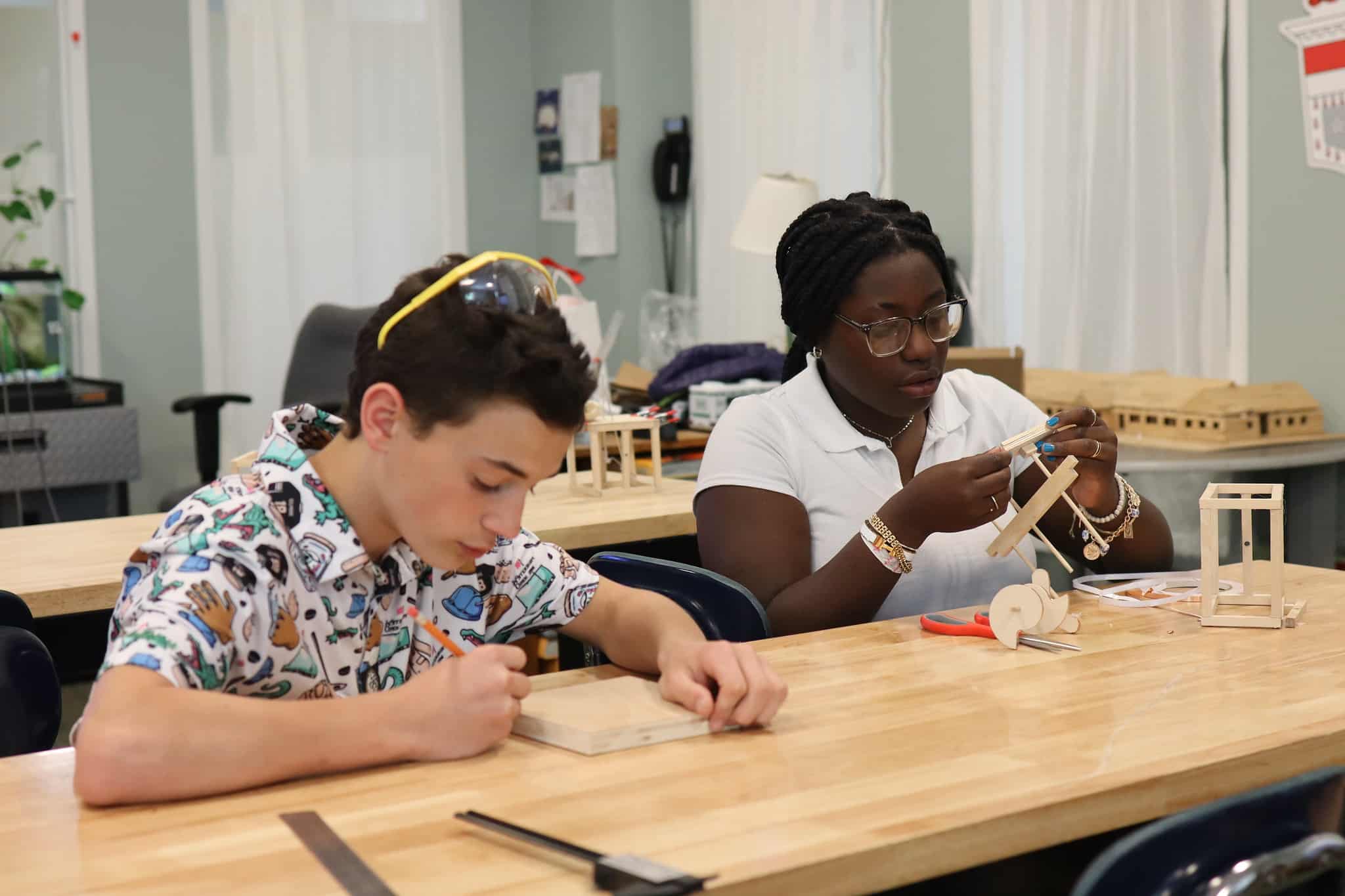
Signature Programs
VIIth Form (Grade 9) can choose from one of four Signature Programs in Makerspace Design, Civics and Current Events, Fine Arts Studies, and Social and Community Leadership.
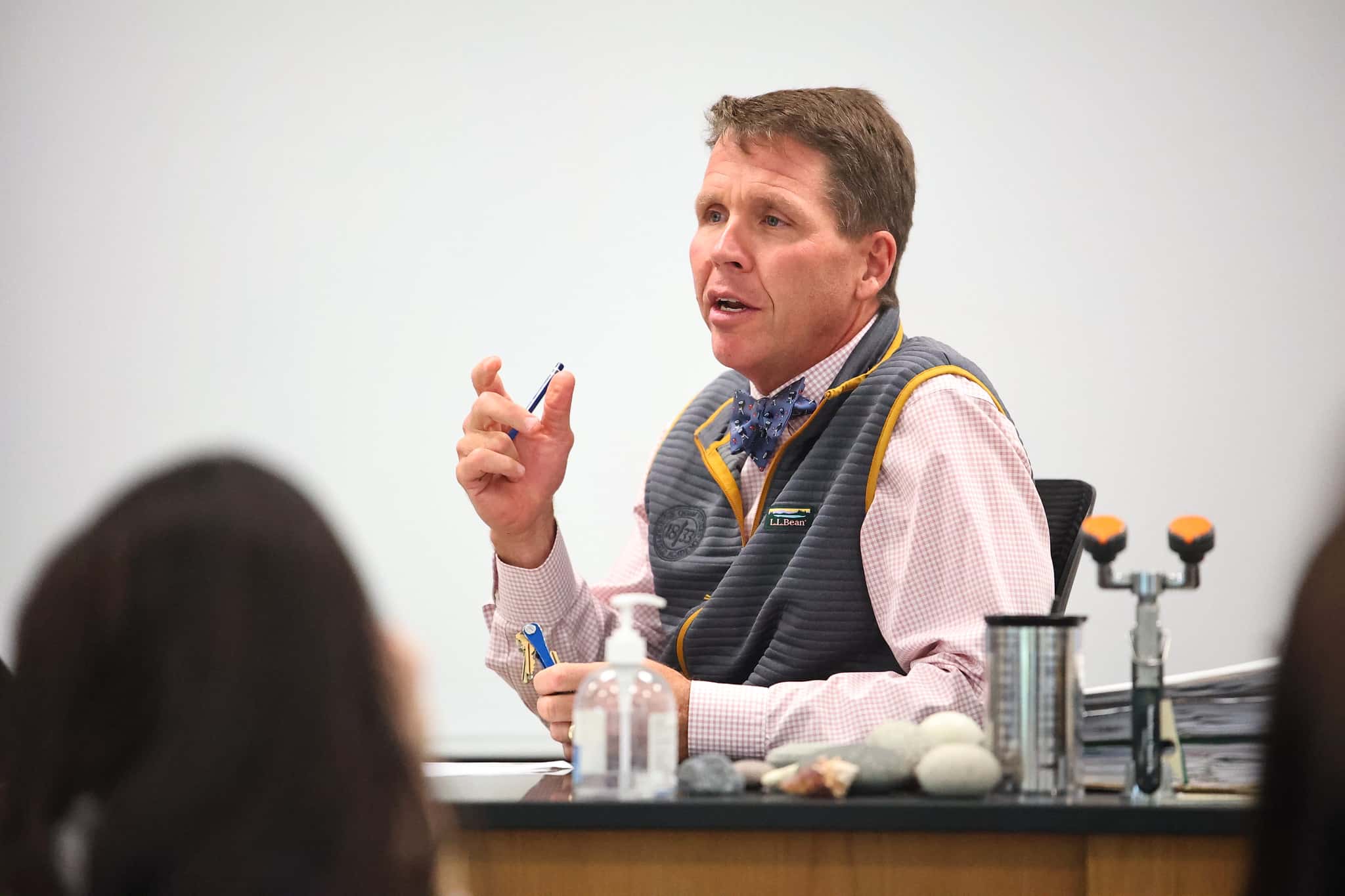
4S—Senior School Search Seminar
This small-group seminar led by the Director of Secondary School Counseling helps students navigate the secondary school process while building key life skills. Through guest visits, mock interviews, and writing workshops, students explore leadership, responsibility, and readiness for their next academic chapter.
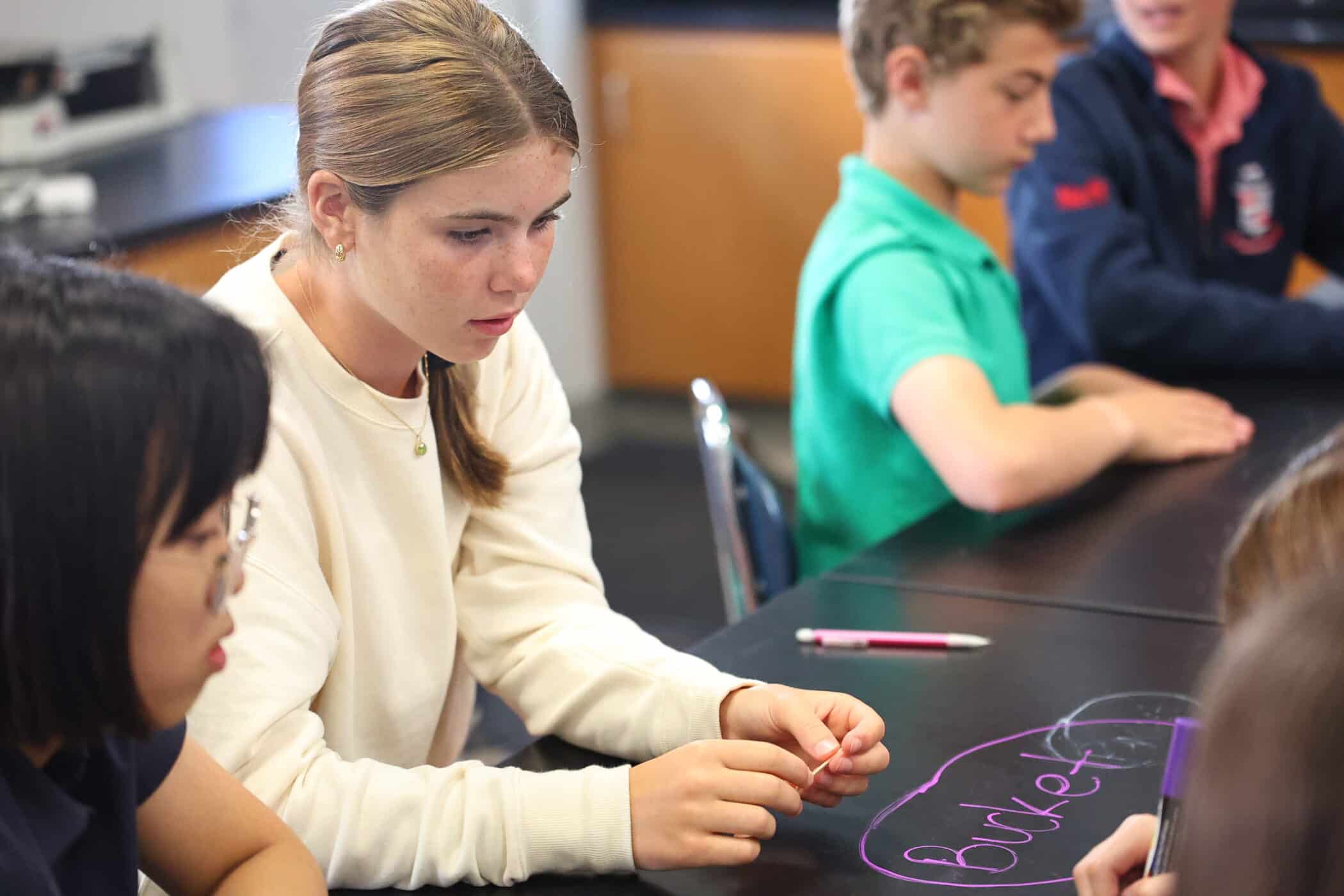
Learning Skills
The Learning Skills Program at Rumsey Hall offers one-on-one instruction during the academic day. Students have the opportunity to attend 50-minute sessions during all five days of the school week.
